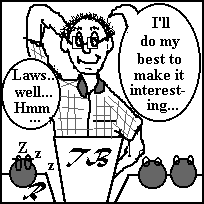 | ||||||
| Articles | Projects | Resume | Cartoons | Windsurfing | Paintings | Album |
Sustainable Development Series: Policy and Legislation
Applying the Principle of Reverse-Onus
to Prosecute Environmental Offences

by Waterose
Jurisprudence of environmental offences is the development of case law that tests the legislation and application of legislation through a series of appeals and sets the precedent for interpretation and application of legislation (Braul, Module 1).
There are two primary divisions of law; public law and private law which is also referred to as common or civil law. Environmental offences are prosecuted as both criminal and private crimes; however, less serious offences are distinguished from criminal crimes as quasi-criminal, regulatory, or public welfare types of crimes (ibid.).
Environmental actions under the common law are often initiated as torts which are a breach of duty for which the offender is liable to action for damages (Boydell, 1998). The four primary types of environmental torts include trespass, nuisance, negligence, and, strict liability (ibid.).
There were two types of liability that applied to environmental actions in Canada; criminal or absolute. Criminal liability, which carries the most severe penalties, applies the principle of true crime which means that the onus is on the crown to prove mens rea, the mental intent, to commit the crime (Braul, Module 1). Absolute liability means that the onus is on the crown to prove that the offence took place, regardless of intent, negligence or moral innocence (ibid.).
Subsequently, a third type of liability was created by the Supreme Court of Canada (SCC) in the case of R. v. City of Sault Ste. Marie, 1978, where the municipality arranged for a contractor to dispose of waste into a landfill site which polluted a creek (Braul, Module 5). Strict liability applies the principle of reverse-onus which means that the onus is on the defendant to prove that due diligence or due care was exercised to prevent harm in order for the accused to avoid liability (ibid.). The SCC reasoned that in this case neither the criminal true crime nor the absolute liability category applied, but rather, a new category for intermediate offences was required (ibid.).
The application of the principle of reverse-onus and due diligence was challenged in the R.v.Wholesale Travel Group, 1991 case under the Canadian Charter of Rights and Freedoms (CCRF). Section 11 (d) of the CCRF that states that any person charged is presumed innocent until proven guilty (WCEL, Internet). The SCC further defined strict liability to mean that the onus is on the defendant to establish due diligence based on the balance of probabilities standard of proof (Braul, Module 5). The reason that section 11 of the CCRF did not apply was because section 1 of the CCRF applies to all sections of the CCRF (WCEL, Internet). Section 1 of the CCRF guarantees all rights and freedoms in the CCRF to such reasonable limits prescribed by law as can be demonstrably justified in a free and democratic society (ibid.). In other words, there are reasonable limitations as to what constitutes presumption of innocence and beyond reasonable doubt. The burden of proof on the accused was further upheld in the R. v. Ellis-Don Ltd. case which was remitted by the SCC after the Wholesale Travel Group decision (Cotton, 1993).
The application of a strict liability defence does not apply if the specific statutory provision requires due diligence as in the case of R. v. Commander Furniture, 1993 where the SCC ruled that the onus was on the crown to prove beyond a reasonable doubt that there was a lack of due diligence as required by the statue (ibid.).
Jurisprudence continues to test the law setting new standards for environmental conduct.
References:
Braul, W. 1994. Environmental Law 1. British Columbia Institute of Technology.
Module 1: Introduction to Environmental Law. Internet URL: http://www.vcn.bc.ca/wcel/otherpub/7021/7021_m1.html.
Module 5: Key Liability Issues. Internet URL: http://www.vcn.bc.ca/wcel/otherpub/7021/7021_m5.html.
Cotton, R. and McKinnon, K. 1993. An Overview of Environmental Law in Canada. in Environmental Law and Business in Canada. Ed. by Thompson, G. Canadian Law Books, Aurora, Ontario. pp. 3-30.
WCEL. 1998. West Coast Environmental Law. Internet. Chapter 1: The Constitutional Context. Internet URL: http://www.vcn.bc.ca/wcel/wcelpub/4994_1.html.
Royal Roads' Tony Boydell lectures on Environmental Legislation

Return to Index of Environmental Articles

 email Waterose
email Waterose
Please Sign My Guestbook
Please View My Guestbook

| Articles | Projects | Resume | Cartoons | Windsurfing | Paintings | Album |
 | ||||||